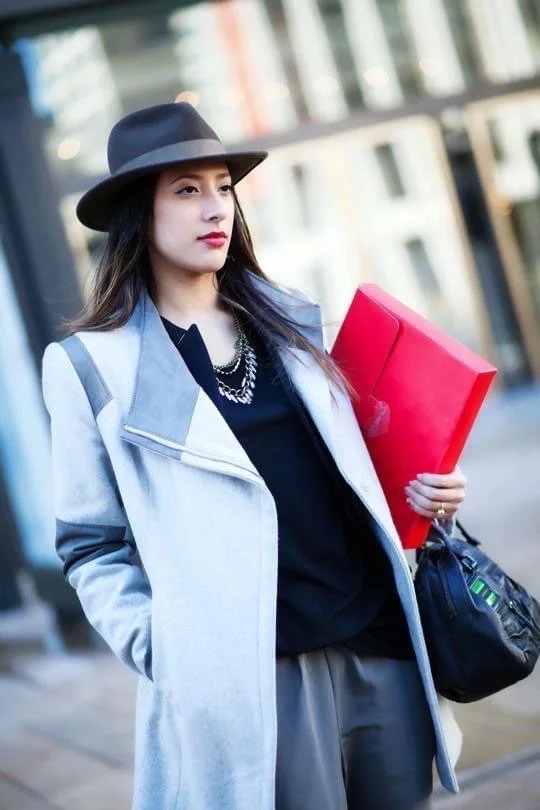Fashion Historian. Archivist & Researcher. Collections Specialist.
Background: First-Generation Latin-American; Second-Generation Immigrant; born in San Francisco, CA, raised bicoastal from Miami, FL, established career in New York.
Education: MSLIS ALA-Accredited in Archival Studies (candidate), St. John’s University; MA in Fashion Studies, Parsons School of Design; BA in Studio Art + Art History minor, University of California, Riverside.
Studies: “Women’s History: 10 Objects, Many Stories“ at Harvard University/ HarvardX; “History of Italian Fashion” at Lorenzo de’ Medici (The Italian International Institute); “Race and American Film” and “Gender in American Culture” at University of California, Berkeley.
Work: Rivas lives in New York and works internationally as an independent researcher, freelance archivist, collections specialist, and global lecturer.
Clients include Helen Uffner Vintage Clothing; Garde Robe by UOVO; The Wardrobe; Parodi Costume Collection; WindowsWear Museum; Coach Archives; andARCHIVE; A Current Affair; The New School Archives and Special Collections; California Museum of Photography, et al.
Previous adjunct assistant professor of Fashion Studies and current Women’s, Gender, and Sexuality Studies instructor at St. John’s University; Former educator at Berkeley College and the Art Institute of Pittsburgh Online Division; Guest speaker at Cardiff University and Parsons School of Design; Creator of the Archaeology of Fashion: And The Discourse on Secondhand Objects, a podcast and research platform.
I am a fashion historian, archivist, and researcher specializing in the preservation of fashion objects, vintage items, and conserved pieces in hybrid collections and diverse spaces. My areas of expertise focus on researching artifacts to provide chronological, cultural, and creative contexts in addition to driving pedagogical initiatives, practicing condition standards management, performing collections care, curating engaging projects, and participating in collaborative productions.
My current inquiries examine the entanglements between eclectic archives, material culture, and women's history across frameworks to sustain the memories of worn history while intellectualizing how we think about everyday fashion to understand the lives of its wearers. I am interested in how fashion, personal style, and the clothes we wear reflect an image of our story and self-identity, used as material (auto)biography in our sartorial evolutions.
What is fashion archiving? What does researching fashion in archives mean?
Fashion archiving provides insight into library and information science within the contours of fashion studies and vice versa. It also raises questions about the role of archivists as guardians of information that interweaves with positions of guardians of material memory; It asserts that clothes are more than “just clothes” and are potent resources ripe for academic and public research.
The objects stored in archives inform our interpretation of fashion as a historical and cultural component. They inherit ways in which civilizations cultivated communication, mediated its expansion and motioned into its selected continuance. Collections that are different in chronology, geography, provenance, and purpose allow the freedom to create research routes to salvage the past, unravel the present and envision the future.
My background in fashion studies (concentration on fashion history and theory) applies specialized knowledge about certain subjects, objects, designs, designers, and their significance, complemented by my current training in library and information science (concentration on archival studies) for the technical skills in ensuring the long-term physical survival of these material objects.
Why is fashion archiving important?
Preservation is a political act. It requires a selection process of principles where feminist thought challenges the assumptions of whose life experience is of value within the archival space, determining what information will be accessible in the future. Therefore, the fine art of fashion archiving can be a radical profession in its effort to give a voice to material objects and their stories, especially artifacts excavated from marginalized communities and minorities. It bares itself as a feminist practice, revealing articles of clothing as repositories of embodied historical knowledge for cultural heritage in the organization and management of human and social records.
With an extensive educational and professional scholarship, my advancing curiosities include researching, writing, archiving, preserving, lecturing, consulting, collaborating, and curating stories within the fine & applied arts and social sciences. I want to migrate subjects within woven histories of archival material off the shelves of private settings, and into the public sphere while drawing connections to everyday life through dress. My goal and mission are to materialize accessibility for fashion intellects, industry professionals, nonexperts, and a global audience not only in the 21st century but for research needs a hundred years from now.





